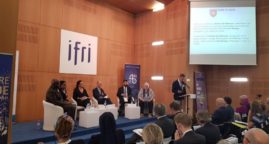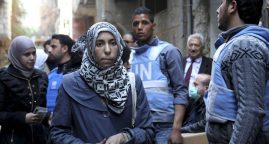Towards a “Global Compact for Safe, Orderly and Regular Migration”: For a permanent dialogue on migration
26/04/2017. “To date, our response to the global phenomenon of migration has too often lacked coherence. There are many stakeholders, but there is insufficient coordination, we pay too much attention to problems and not enough solutions. We may be in a better position to respond to immediate needs, yet we are struggling to formulate a comprehensive and long-term vision for human mobility. ” William L. Swing, Director of the International Organization for Migration (IOM), to the IOM Council in Geneva in December 2016.
Strengthening international cooperation on migration and migration governance with a view to adopting a Global Compact for Safe and Orderly Migration in 2018 is The objective set by the international community at the New York Summit on Refugees and Migrants on 19 September 2016.
After the meetings in Geneva on 5, 6 and 7 April of the Global Forum on Migration and Development (GFMD), a first workshop on the International Dialogue on Migration – IDM) to contribute to the preparatory work of the Covenant was held in New York on 18 and 19 April.
This first International Migration Dialogue (IDM) of the International Organization for Migration (IOM) since IOM joined the United Nations last year, brought together more than 300 representatives of States, Civil society and other key players in the field.
Participants made recommendations to develop coherence between different levels of migration governance, to promote mechanisms for cooperation on migration and to identify concrete elements for the creation of a global migration framework.
“The Global Compact represents a historic opportunity to achieve the goal of a world where migrants move by choice rather than necessity, a world of safe, orderly and regular migration opportunities and a world in which Migration is well managed and represents a positive force for individuals, societies and states, “said William Lacy Swing, IOM Director General, in his opening address. “IOM is creating a Global Compact that will put the needs, capabilities and contributions of migrants in the heart of its mission to ensure their security, dignity and fundamental rights. ”
Louise Arbor, Special Representative of the Secretary-General for International Migration (SRSG), joined Ambassador Swing in stressing that the international community now has “the great responsibility to work for a safe, orderly and regular In order to improve the lives of millions of migrants, those whom they leave behind and those who will welcome them on their way to their final destination. “It is up to all of us here to fully accept human mobility and to recognize that good governance of migration requires commitment to real cooperation. ”
“We need to recognize the contributions of migrants who migrate regularly. They fill gaps in the workforce, strengthen the economy, create jobs through entrepreneurship, bring youth to countries where birth rates are low and share their culture with the people in their communities. Country of adoption, “said Ahmed Hussen, Canadian Minister of Immigration, Refugees and Citizenship.
“The strategy we have planned is global: it takes into account the emerging attitude of public opinion, linked to the feeling of insecurity of our citizens, and calls for better management of the borders. It also takes into account the need to change the discourse on migration, highlighting its positive aspects and the contribution of migrants to a multicultural and prosperous society, “said Luigi Maria Vignalli, Director General for Migration Policy of the Italian Ministry Foreign Affairs.
Bishop Robert J. Vitillo, Secretary General of the International Catholic Commission on Migration, advocated an “approach focused on Sustainable Development Goals”, starting with the most urgent and achievable, including more systematic determination of the best interests of The reform of the recruitment practices of workers, alternatives to detention and orderly departure programs.
The results of this IDM and the second planned on July 18 and 19 in Geneva will feed into the consultation phase of the Global Compact on Migration which will culminate in the preparatory meeting in Mexico in December.
In Geneva, at the beginning of April 2017, Governments were unanimous in asserting that the Global Pact on Migration would not be a binding instrument (ie not a treaty but rather a declaration) and should be based on the existing instruments of international law In particular human rights, labor law and, where appropriate, international humanitarian law and refugee law), but must include concrete commitments for a humane, orderly and secure migration. Under the joint chairmanship of Germany and Morocco, Governments reaffirmed their willingness to lead negotiations (in contrast to the Istanbul Humanitarian World Summit in May 2016, which was largely led by the United Nations Secretariat ). The role of the United Nations system (International Organization for Migration (IOM / IOM), International Labor Organization (ILO), United Nations Development Program (UNDP), High Commissioner for Refugees Human Rights, World Bank, World Health Organization (WHO), United Nations University, etc.) and other humanitarian organizations such as the ICRC, the International Federation of Red Cross and Red Crescent Societies, Red Cross, and academic institutions will facilitate negotiation and contribute to reflection, as also civil society, including private economy, which is of particular interest for migration, and religious-based organizations, which have often expressed their concern about the fate of certain migrants, not to mention diasporas, local communities of origin, transit and reception, as well as migran Themselves.
These initial negotiations on the substance have clearly shown the magnitude of the human, economic and security challenges and the obstacles to be avoided in order not to diminish the existing texts protecting migrants and their families. And as for refugees, the causes of these migrant movements will have to be tackled: armed conflicts, poverty (as well as economic imbalances within and between countries), and environmental and climate problems. Again, it will be necessary to mobilize the will of States and civil society actors to make concrete commitments to take effective measures in collaboration with other States, regional organizations (in particular the African Union, the Arab League and The European Union) and with economic, training, humanitarian, media and religious actors of civil society. Beyond declarations and ad hoc measures, attention will also have to be paid to the figures: movements of people, demographic trends, the fundamental question being to commit the resources needed to meet the needs. We’re still a long way off.
Several deadlines for this humanitarian diplomacy on migration are announced:
- in the context of the “Budapest Process” (www.budapestprocess.org), an advisory forum of some 50 Governments and 10 international organizations founded in 1993, and developed from Central Europe along the “Silk Road (« Implementation of the Silk Routes Partnership for Migration ») , A workshop in Islamabad (Pakistan National Workshop on Labor Migration Policy Development) on 27 and 28 April, and on 7 and 8 May in Dhaka, Bangladesh, Then, from 8 to 12 May, in Istanbul, a workshop for Afghan officials (“Training of Trainers for Afghan Officials”);
- a thematic workshop of the GFMD on migration and climate change in Rabat on 24 May 2017;
- the 106th International Labor Conference in Geneva from 5 to 16 June, where the issue of the rights of migrant workers will have an important place;
- the Global Remittances, Investment and Development Forum, organized by the United Nations, World Bank and IFAD, will be held in New York on 15-16 June (Global Forum on Remittances, Investment and Development 2017 “);
- the GFMD Summit in Berlin from 28 to 30 June 2017, followed by the Civil Society Days (CSD) from 29 June to 1 July;
- In July, the first results of the GFMD will be presented at the High-Level Political Forum (HLPF), July 17-19 in New York (https: //sustainabledevelopment.un .org / hlpf / 2017);
- from 28 November to 1 December 2017, the IOM Council in Geneva.
This schedule should also include bilateral agreements between countries of origin (in particular African) and destination (eg European), development and implementation of national policies (the Philippines to protect nationals working abroad Is often cited as an example, those of Germany, Canada and Sweden to accommodate foreign migrants as well). Migration is therefore constantly on the agenda of Governments, international organizations, humanitarians, civil society in general, including the private sector, research and training centers, and Public awareness and national and international security.
More than a declaratory text to be adopted in 2018, it is indeed a permanent and open dialogue on migration that must be established. On 15 March 2017, on the initiative of the United Kingdom, the Security Council deliberated – without passing a resolution – on the United Nations Convention against Transnational Organized Crime and on the need for Combat the many forms of trafficking in human beings, the victims of which include migrants in the hands of criminal networks. Delegations took advantage of this debate on trafficking in conflict situations held at the ministerial level to present their initiatives to combat a scourge affecting 106 countries, 80 per cent of whom are women . This fall, the United Nations General Assembly should assess the efforts made. And the Human Rights Council in Geneva, such as the World Health Assembly and the International Labor Conference and the World Economic Forum meetings, will also be part of these platforms for dialogue on migration.
Michel Veuthey Deputy Permanent Observer of the Order of Malta at the U.N. in Geneva
Related Articles
How to better fight human trafficking: The Order of Malta organizes conference with international experts to forge new synergies
10/09/2019. The Order of Malta organizes conference with international experts to forge new synergies
On world day against human trafficking the Order of Malta calls for increasing joint efforts
07/27/2018. The Sovereign Order of Malta appeals to take measures to prevent and end human trafficking, while protecting and assisting victims and survivors.
Unity within Security Council vital to prevent mass atrocities – UN chief Guterres
04/18/2017. “We must collectively draw strength from the letter and spirit of the Charter to better prevent armed conflict and sustain peace through development [by] ensuring effective protection of all human rights – civil, political, economic, social and cultural,”






